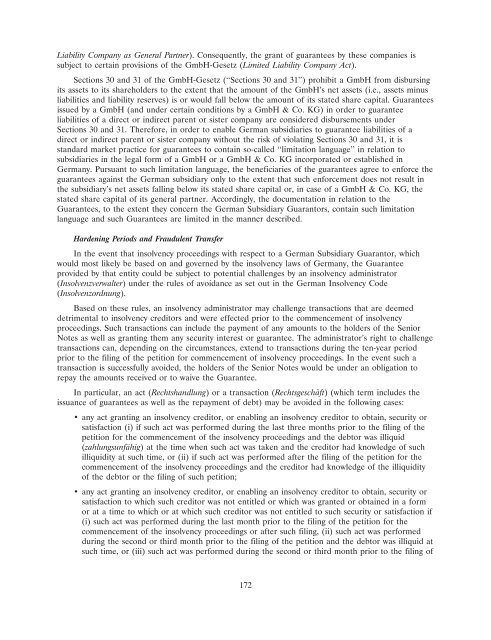Ardagh Glass Finance plc - Irish Stock Exchange
Ardagh Glass Finance plc - Irish Stock Exchange
Ardagh Glass Finance plc - Irish Stock Exchange
Create successful ePaper yourself
Turn your PDF publications into a flip-book with our unique Google optimized e-Paper software.
Liability Company as General Partner). Consequently, the grant of guarantees by these companies is<br />
subject to certain provisions of the GmbH-Gesetz (Limited Liability Company Act).<br />
Sections 30 and 31 of the GmbH-Gesetz (‘‘Sections 30 and 31’’) prohibit a GmbH from disbursing<br />
its assets to its shareholders to the extent that the amount of the GmbH’s net assets (i.e., assets minus<br />
liabilities and liability reserves) is or would fall below the amount of its stated share capital. Guarantees<br />
issued by a GmbH (and under certain conditions by a GmbH & Co. KG) in order to guarantee<br />
liabilities of a direct or indirect parent or sister company are considered disbursements under<br />
Sections 30 and 31. Therefore, in order to enable German subsidiaries to guarantee liabilities of a<br />
direct or indirect parent or sister company without the risk of violating Sections 30 and 31, it is<br />
standard market practice for guarantees to contain so-called ‘‘limitation language’’ in relation to<br />
subsidiaries in the legal form of a GmbH or a GmbH & Co. KG incorporated or established in<br />
Germany. Pursuant to such limitation language, the beneficiaries of the guarantees agree to enforce the<br />
guarantees against the German subsidiary only to the extent that such enforcement does not result in<br />
the subsidiary’s net assets falling below its stated share capital or, in case of a GmbH & Co. KG, the<br />
stated share capital of its general partner. Accordingly, the documentation in relation to the<br />
Guarantees, to the extent they concern the German Subsidiary Guarantors, contain such limitation<br />
language and such Guarantees are limited in the manner described.<br />
Hardening Periods and Fraudulent Transfer<br />
In the event that insolvency proceedings with respect to a German Subsidiary Guarantor, which<br />
would most likely be based on and governed by the insolvency laws of Germany, the Guarantee<br />
provided by that entity could be subject to potential challenges by an insolvency administrator<br />
(Insolvenzverwalter) under the rules of avoidance as set out in the German Insolvency Code<br />
(Insolvenzordnung).<br />
Based on these rules, an insolvency administrator may challenge transactions that are deemed<br />
detrimental to insolvency creditors and were effected prior to the commencement of insolvency<br />
proceedings. Such transactions can include the payment of any amounts to the holders of the Senior<br />
Notes as well as granting them any security interest or guarantee. The administrator’s right to challenge<br />
transactions can, depending on the circumstances, extend to transactions during the ten-year period<br />
prior to the filing of the petition for commencement of insolvency proceedings. In the event such a<br />
transaction is successfully avoided, the holders of the Senior Notes would be under an obligation to<br />
repay the amounts received or to waive the Guarantee.<br />
In particular, an act (Rechtshandlung) or a transaction (Rechtsgeschäft) (which term includes the<br />
issuance of guarantees as well as the repayment of debt) may be avoided in the following cases:<br />
• any act granting an insolvency creditor, or enabling an insolvency creditor to obtain, security or<br />
satisfaction (i) if such act was performed during the last three months prior to the filing of the<br />
petition for the commencement of the insolvency proceedings and the debtor was illiquid<br />
(zahlungsunfähig) at the time when such act was taken and the creditor had knowledge of such<br />
illiquidity at such time, or (ii) if such act was performed after the filing of the petition for the<br />
commencement of the insolvency proceedings and the creditor had knowledge of the illiquidity<br />
of the debtor or the filing of such petition;<br />
• any act granting an insolvency creditor, or enabling an insolvency creditor to obtain, security or<br />
satisfaction to which such creditor was not entitled or which was granted or obtained in a form<br />
or at a time to which or at which such creditor was not entitled to such security or satisfaction if<br />
(i) such act was performed during the last month prior to the filing of the petition for the<br />
commencement of the insolvency proceedings or after such filing, (ii) such act was performed<br />
during the second or third month prior to the filing of the petition and the debtor was illiquid at<br />
such time, or (iii) such act was performed during the second or third month prior to the filing of<br />
172
















